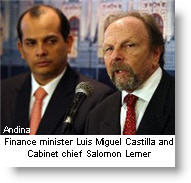 Cabinet chief Salomon Lerner was in Congress Thursday with the minister of Economy and Finance, Luis Miguel Castilla, to present the government’s 2012 budget for approval.
Cabinet chief Salomon Lerner was in Congress Thursday with the minister of Economy and Finance, Luis Miguel Castilla, to present the government’s 2012 budget for approval.
Lerner said the budget focuses on ending corruption, reducing the deficit of infrastructure nationwide, boosting social programs, and gradually and specifically increasing public investment in rural areas to bridge the gap with urban areas.
The budget is for S/.95.5 billion ($35 billion), with a GDP growth forecast of 6%, accumulated inflation of 6%, and the dollar exchange at 2.75 soles. The budget is 5% higher than last year’s, and includes a 20% increase in the social focus of different lines, including education, health and development.
This raises the social focus in the budget to 43%. Significant resources are being assigned to interventions in early childhood and in basic childhood education.
“Real social inclusion is attained when a qualified work force contributes to the improvement of productivity and economic growth and has access to salaries that improve their living conditions and welfare of their families,” said Lerner.
Finance minister Castilla said the budget also assigns 2.3 billion soles to citizen safety, focused on the fact that 85% of the population believe they will be victims of some form of crime in the next 12 months.
The security line includes improving infrastructure, operations and prevention and response actions at 1,388 police stations nationwide, improving and increasing street patrol, and increasing the number of police per inhabitant from one officer per 291 people in 2011 to one per 282 inhabitants in 2012. The international standard is one policeman per 250 inhabitants.
Lerner said his cabinet would assess the suggestions made in the Congressional debate and would return to Congress “whenever necessary” to clarify and discuss the budget. “Our idea is to receive these options, these alternatives seriously, to assess them….to make this budget for all Peruvians.”






Citizens neighborhood watch groups are an economic way to improve safety. It works without wages. The people within a boundary take turns walking the neighborhood making observations regarding who is visiting and things unusual and those who have agreed to be safe houses have a sign in the window so if a member of the neighborhood is out and about and finds themselves in peril they are able to be safe there.